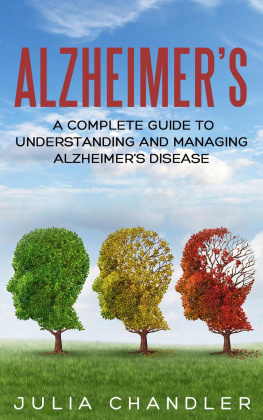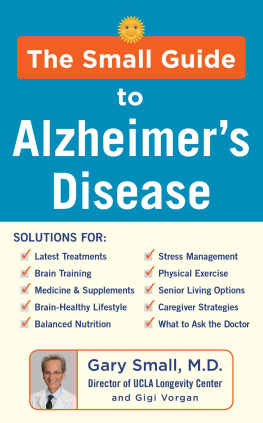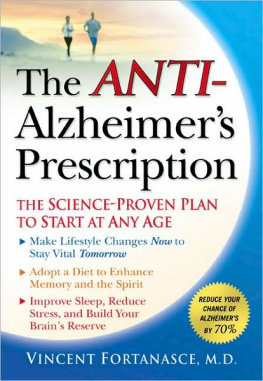
Fight
Alzheimers
with Vitamins and
Antioxidants
Fight Alzheimers with Vitamins and Antioxidants by Kedar Prasad, Ph.D., contains clinically and scientifically valid information presented in an easy-to-follow format that informs the reader about the value of vitamins, antioxidants, and micronutrients in preventing and/or slowing the symptoms of Alzheimers disease. It captures up-to-date scientific information on the pathology of Alzheimers disease and the state of its therapy and presents a straightforward argument on the values of vitamins and antioxidants.
The tables that show dietary reference intakes (DRI) are a great feature. The information allows the text to serve as a source of reference, supplying data that readers can use to make their own judgments about dosages of vitamins and antioxidants.
CLIVEL G. CHARLTON, PH.D., DIRECTOR FOR THE CENTER FOR MOLECULAR AND BEHAVIORAL NEUROSCIENCE COLLEGE OF MEDICINE AT MEHARRY MEDICAL COLLEGE
Fight Alzheimers with Vitamins and Antioxidants offers a simple and inexpensive means to delay the onset and progression of the disease. This safe, straightforward approach involves readily accessible vitamins and other micronutrients. Prasads book is full of valid and excellent suggestions on how to interfere with the evolution of Alzheimers. I strongly recommend this book.
STEPHEN C. BONDY, PH.D., PROFESSOR, DEPARTMENT OF MEDICINE, UNIVERSITY OF CALIFORNIA
ACKNOWLEDGMENTS
I would like to thank my family for their support and encouragement. I also am very thankful to Anne Dillon and Chanc VanWinkle Orzell for their superb editing of this book.
PREFACE
Why Should You Read This Book?
Alzheimers disease, a progressive disorder that attacks the neurons in the brain, accounts for 60 to 80 percent of all dementia cases. Although it typically affects older individuals, it also can affect younger people carrying mutated genes; indeed up to 5 percent of individuals afflicted with Alzheimers disease have what is known as early onset Alzheimers, which can present with symptomatology when individuals are in their 40s or 50s. This is due to a familial Alzheimers in which mutations in certain genes cause the onset of this disease earlier. Symptoms of Alzheimers disease may include memory loss, a decrease in problem-solving abilities, difficulty completing ordinary chores and tasks, confusion, depression, spatial disorientation, difficulty speaking or writing, losing things, poor judgment, social withdrawal, and mood changes.
Alzheimers disease remains a major medical concern in the United States, given that it strikes primarily older people (age sixty-five and over). This demographic is expected to increase from about 40.2 million in 2010 to about 89 million by the year 2050 (U.S. Census Bureau, 2010). Consequently, this disease will create huge health problems and be a burden on society in terms of the cost of its management.
At present, there is no adequate strategy for the prevention of Alzheimers disease, and its treatment options remain unsatisfactory. In this book I propose a unified hypothesis that increased oxidative stress and chronic inflammation are primarily responsible for the initiation and progression of this disease. Therefore, mitigating oxidative stress and chronic inflammation appears to be a logical solution to reduce the diseases development and progression. The proposed strategy, in combination with standard therapy, may improve management outcomes more than just utilizing standard therapy alone.
In order to reduce oxidative stress and chronic inflammation, its essential to increase the bodys levels of all antioxidant enzymes and all standard dietary and endogenous antioxidants. This goal cannot be achieved by the use of the one or two antioxidants that have been used in clinical studies for the prevention or treatment of in some neurodegenerative diseases in humans. Therefore, I have proposed that a preparation of micronutrients containing multiple dietary and endogenous antioxidants, B vitamins with high doses of vitamin B3 (nicotinamide), vitamin D, selenium, and certain polyphenolic compounds (curcumin and resveratrol) should be employed in clinical studies for reducing the risk of development and progression of Alzheimers disease. These micronutrients are capable of increasing the levels of all antioxidant enzymes by activating a nuclear transcriptional factor-2/antioxidant response element (Nrf2/ARE) pathway, as well as by enhancing the levels of standard dietary and endogenous antioxidants.
Most neurologists believe that antioxidants and vitamins have no significant role to play in the prevention or the improved management of Alzheimers disease. These beliefs are primarily based on a few clinical studies in which supplementation with a single antioxidant, such as vitamin E, produced modest beneficial effects or no effect. However, the brains of patients with a neurodegenerative disease such as Alzheimers may be a characterized by a high oxidative environment. Therefore, the administration of a single antioxidant should not be expected to produce any significant beneficial effect. This is because an individual antioxidant in the presence of a highly oxidative environment may be oxidized to act as a pro-oxidant rather than an antioxidant. Coupled with this is the fact that levels of the oxidized form of the antioxidant may increase after the prolonged consumption of the single antioxidant. This increase can damage brain cells. In addition, a single antioxidant cant enhance the levels of antioxidant enzymes as well as the levels of dietary and endogenous antioxidants.
In peer-reviewed journals I have published several reviews that challenge the current trend of using a single antioxidant for the prevention and/or management of neurodegenerative diseases in high-risk populations. These articles have failed to have any significant impact on the design of clinical trials, however, and the inconsistent results of the effects of a single antioxidant continue to be published. And although some books on neurodegenerative diseases and their causes and symptoms are available, none of them have critically analyzed the published data on the effects of antioxidants on neurodegenerative diseases. Nor have they questioned whether the experimental designs of the study on which the conclusions were based were scientifically valid; whether the results obtained from the use of a single antioxidant in a high-risk population may be extrapolated to the effect of the same antioxidant in a multiple antioxidant preparation for the same population; or whether the results of studies obtained on high-risk populations can be extrapolated to normal populations.
The growing controversies regarding the value of multiple micronutrients in the prevention and improved management of neurodegenerative diseases need to be addressed, and new solutions need to be proposed. This book articulates the reasons for the controversies mentioned above and proposes evidence and scientifically based, rational solutions for the prevention and improved management of Alzheimers disease.
To set us on the right track, we must first begin with clinical studies that utilize a preparation of various micronutrients, not just one or two. The validity of this expanded approach is supported by two recent clinical studies pertaining to other diseases. In contrast to previous studies in which supplementation with beta-carotene alone increased the risk of lung cancer among heavy tobacco smokers, two clinical studies utilizing a preparation of multiple antioxidants revealed a reduced incidence of cancer by 10 percent and an improved clinical outcome in patients with HIV/AIDS. These studies were published in the
Next page




